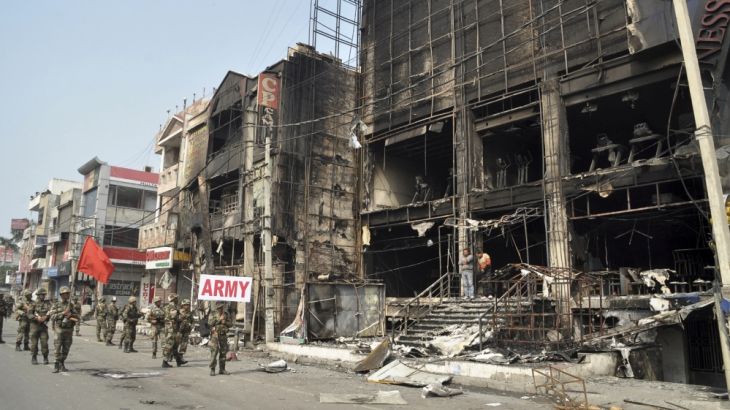India caste protesters accept government offer
Authorities in the state of Haryana say they expect to restore order following riots that killed at least 12 people.

Indian protesters demanding better conditions for their caste say they have accepted a state government offer, as troops established control over a canal that supplies much of the capital’s water.
Authorities in the northern state of Haryana said on Monday they expected that order would be restored after apparently reaching a deal with leaders of the Jat caste, who said they were discussing whether to call off violent protests that have lasted more than a week.
Police say that at least 12 people have been killed in rioting by members of the Jat community, who had called for caste-based quota systems.
The violence in the north Indian state of Haryana on Saturday and Sunday also affected water supplies in the capital New Delhi as protesters cut off canal gates feeding treatment plants that supply a reported 60 percent of the city’s tap water.
Officials said that the state began lifting a curfew in key towns as protesters removed roadblocks. Thousands of troops with shoot-on-sight orders had been deployed to Haryana to quell the violence.
The week-long demonstrations turned violent on Friday with protesters setting fire to homes, shops and government buildings, as well as blocking motorways.
|
|
Authorities had urged people to ration water and Delhi schools were ordered to be closed before the security forces flushed out thousands of protesters overnight.
However, the crisis appeared to ease after the state government on Sunday agreed that the Jat community should be given quotas for highly sought-after government jobs and university places under India’s caste-based quota system.
On Monday, a Jat representative told the AFP news agency that the community had accepted the government’s offer.
Jats are the single largest community in Haryana, with nearly eight million members, and are traditionally a farming community.
They were angered by comments in recent weeks from a leader of the Bharatiya Janata Party, which rules the state and the nation, who opposed quotas for them.
India already sets aside a proportion of jobs and university places for Dalits, known as “untouchables”, and for other so-called “backward castes”, under measures intended to remedy centuries of discrimination.
![Protesters from the Jat agricultural community blocked a highway linking New Delhi to Rohtak on Sunday [AP/Tsering Topgyal]](/wp-content/uploads/2016/02/f041421ff79843c18d5ae515b92f1a6f_18.jpeg)